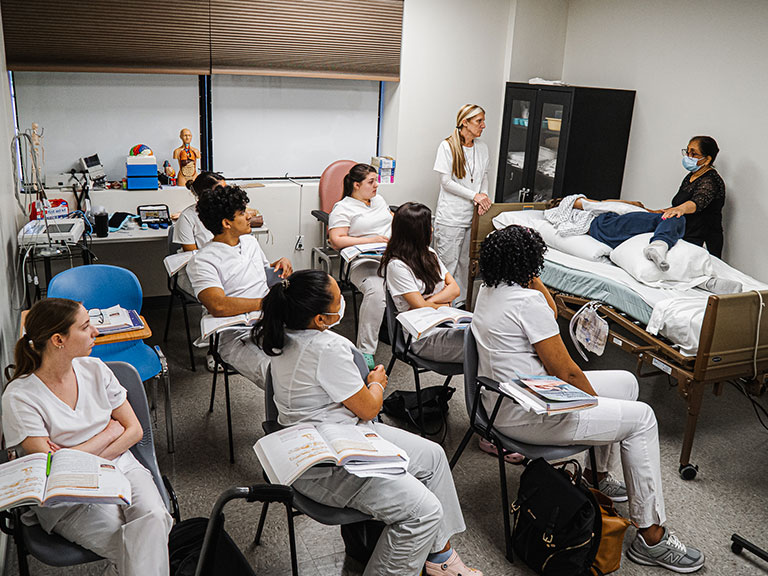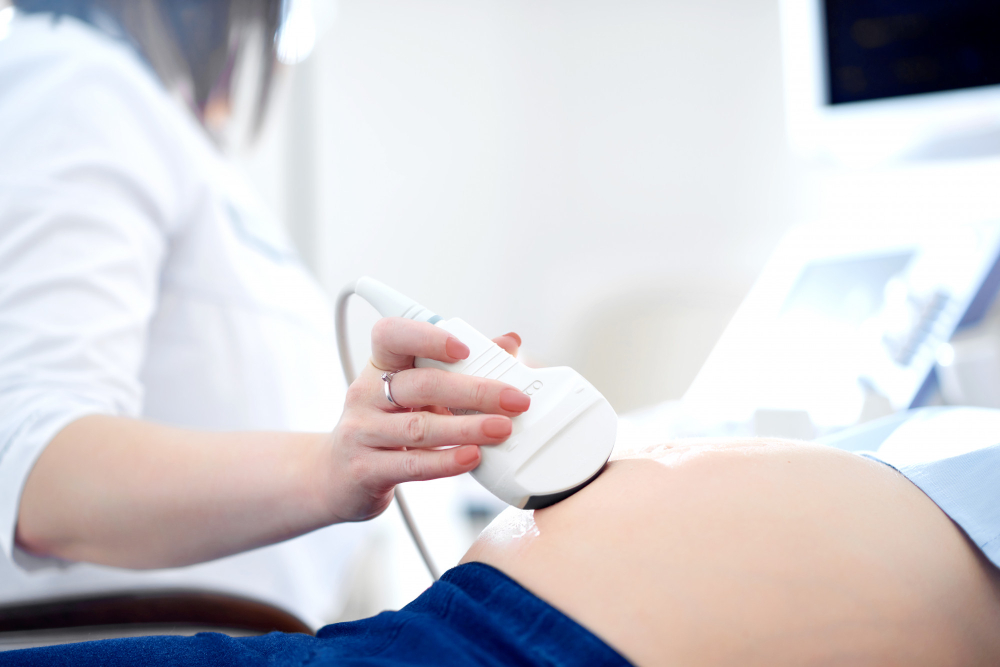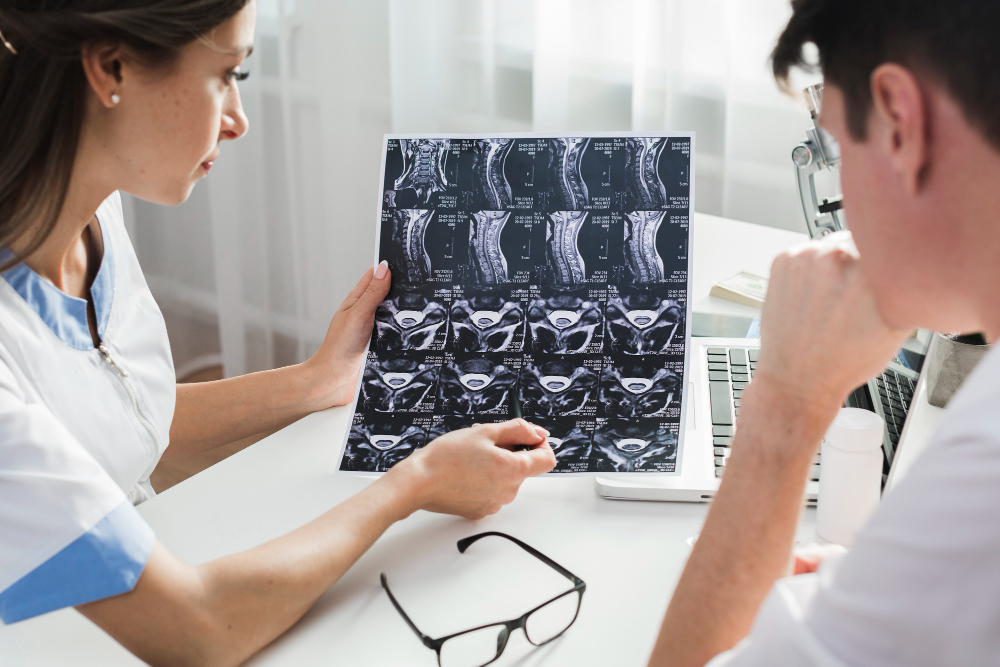Ultrasound Technicians are in high demand on Long Island and all over New York for both full-time and part-time work in areas like Garden City, New Hyde Park, Mineola, and West Hempstead. Receiving formal sonography training in Garden City from NY Med Training will give you a competitive edge with potential employers.

Medical Terminology is the study of the basic structure of medical words, including prefixes, suffixes, word roots, combining forms, singulars, and plurals. By combining prefixes, suffixes, and roots, the student will be able to recognize, spell, pronounce, and define medical words.
This course reviews the normal anatomy and physiology of the human body and then expands those concepts in the context of sonographic appearance, including cross-sectional anatomy and physiology of abdominal, vascular, obstetrical, and gynecological structures. Among the main goals of the course is to provide structured information and guidelines for adequate-quality scanning procedures.
Introduction to patient care skills applied to the sonographer role in an imaging department. An exploration of nursing care skills, scanning ergonomics, patient confidentiality, and communication skills with hospital personnel as applied to all areas of sonography.

This course is designed to cover a broad range of physics topics. As these topics are applied to various problem situations, the student will develop critical thinking skills, and through the use of group activities, the student will enhance cooperative attitudes. Topics include computer technologies, math calculations, mechanics, measurement, heat, fluid and gas laws, atomic and nuclear physics, electromagnetics, light, and sound.
Examines the clinical applications within the specialty of abdominal sonography, including interpretation of normal and abnormal sonographic patterns, pathology, related clinical signs and symptoms, normal variants, and clinical laboratory tests, including laboratory sessions on basic scanning techniques and protocols.
The course teaches scanning techniques, basic scanning protocols, and normal characteristics for evaluating the reproductive organs and development as well as abnormal/small parts. Students will able to recognize transducer cleaning/preparation, image orientation scan plane, and transducer plane, the ultrasound appearance of the pathologies, the imaging characteristics of commonly seen pathology associated with testes and scrotum, the imaging characteristics of commonly seen pathology associated with prostate and the imaging characteristics of commonly seen pathology associated with the musculoskeletal system.

The course teaches the recognition of transducer cleaning/preparation, image orientation scan plane and transducer plane, the ultrasound appearance of pathologies, and the imaging characteristics of commonly seen pathology associated with thyroid and parathyroid.
The course consists of describing scanning techniques, basic scanning protocols and normal characteristics of the breast, transducer cleaning/preparation, image orientation scan plane and transducer plane, and the ultrasound appearance of breast pathologies.
The course describes scanning techniques, basic scanning protocols, and typical characteristics for evaluating the reproductive organs and development as well as abnormal/small parts. Students will be able to recognize transducer cleaning/preparation, image orientation scan plane, transducer plane, the ultrasound appearance of the pathologies, and the imaging characteristics of commonly seen pathology associated with neonatal spinal columns. Students will also be able to recognize and demonstrate the imaging characteristics of commonly seen pathology associated with neonatal hip, neonatal echocardiography, musculoskeletal system, and neonatal spinal column.

The course instructs and demonstrates the clinical laboratory test and signs and symptoms used to evaluate abdominal organs and small parts pathology, GYN. The course will explain the standard patient positions related to sonographic images. The course demonstrates scanning techniques, basic scanning protocols, and typical characteristics or evaluation of the Liver, Gallbladder, Biliary Tree, Pancreas, Kidney, Spleen, Retroperitoneal Vasculature, Thyroid and Parathyroid, Breast, Adrenal Gland, Testes and Prostate Gland, Ovary and Uterine, GYN. The course will also teach scanning techniques, basic scanning protocols, and normal characteristics for evaluating reproductive organs and their development and abnormal/small parts.
The course teaches the clinical laboratory tests and signs and symptoms used to evaluate abdominal organs and small parts pathology, OB. Students will be able to describe and demonstrate the standard patient positions related to sonographic images. The course also teaches normal fetal anatomy and applies appropriate measurements. The course will also estimate gestational age by ultrasound evaluation to confirm clinical dating for patients.
The course instructs and demonstrates the clinical laboratory test and signs and symptoms used to evaluate abdominal organs and small parts pathology, OB. It will also describe the standard patient positions related to sonographic images. The instructor will explain normal fetal anatomy and apply appropriate measurements. It will also emphasize estimated gestational age by ultrasound evaluation to confirm clinical dating for patients undergoing elective repeat cesarean delivery and labor induction. The course will also describe and evaluate fetal growth (when the patient has an identified etiology for uteroplacental insufficiency, such as severe diabetes mellitus, or for other medical complications of pregnancy when fetal malnutrition, i.e., intrauterine growth retardation (IUGR) or macrosomia, is suspected).

The course will explain and demonstrate the clinical laboratory tests and signs and symptoms used to evaluate abdominal organs and OB. It will also describe and demonstrate the standard patient positions related to sonographic images. The instructor will explain the normal fetal anatomy and apply appropriate measurements. The course also teaches how to estimate gestational age by ultrasound evaluation to confirm clinical dating for patients undergoing elective repeat cesarean delivery and labor induction. The course will explain fetal growth (when the patient has an identified etiology for uteroplacental insufficiency, such as severe diabetes mellitus, or for other medical complications of pregnancy when fetal malnutrition, i.e., intrauterine growth retardation (IUGR) or macrosomia, is suspected). The course teaches how to perform a biophysical profile for fetal well-being (after 28 weeks of gestation).
The course consisted of teaching the anatomy of the vascular system. The course also demonstrates the common vascular diseases for which ultrasound is critical as a noninvasive diagnostic tool. The course instructs and demonstrates the anatomy of the peripheral arterial system. Students can describe the arterial Doppler signals obtained during arterial duplex. Students will also be able to recognize the factors associated with stroke. In addition, students will know the anatomy encountered during a carotid duplex imaging examination. Finally, the course also teaches students to recognize the imaging characteristics associated with an internal carotid artery occlusion and the pathologies associated with a carotid artery.
The course concentrates on the anatomy of the vascular system. Students will be able to recognize and demonstrate the common vascular diseases for which the application of ultrasound is critical as a noninvasive diagnostic tool, the risk factors associated with peripheral arterial diseases, the signs and symptoms of peripheral arterial diseases, and the anatomy of the peripheral arterial system. Students will also be able to describe the arterial Doppler signals obtained during arterial duplex. The course teaches the factors associated with venous diseases, the signs and symptoms of venous diseases, the characteristics of a normal venous system, the imaging characteristics of venous duplex imaging, and the imaging characteristics associated with deep vein thrombosis and venous reflux.

The Health Insurance Portability and Accountability Act of 1996 (HIPAA) prompted new Federal regulations that require physicians to ensure they protect the privacy and security of patients' medical information and use a standard format when submitting electronic transactions, such as claims to payers.
This course discusses and compares students' experiences from internships, such as workplace behavior. Students will learn how to perform job searches and where to find such information. Students will also learn about national and state/local branches of professional organizations in the field, notably SDMS and CCI. This course also prepares resumes in formats used for Allied Health jobs.
After completing 1440 Classroom hours, students have to complete 810 Hours of internship to complete the course. The school will cover all equipment, such as Books, Uniforms, and CPR Certification.
| Schedules | Mornings | Evenings | Weekends |
|---|---|---|---|
| 9:00am - 3:00pm | 5:00pm - 10:00pm | Fri (5:30pm - 9:30pm) | |
| Mon - Fri | Mon - Fri | Sat, Sun (9:00 am - 6:00 pm) | |
| 48 weeks | 72 Weeks | 72 Weeks | |
| Course Fee: | Books Fee: | Registration Fee: | Total: |
| $33,400 | $1,500.00 | $100.00 | $35,000.00 |
The Diagnostic Medical Sonography program spans 2,250 hours. We offer flexible options, including weekday, evening, and weekend classes, to accommodate diverse schedules.
The program's total cost is $35,000, encompassing tuition, registration fees, and textbooks. This fee includes essential materials such as uniforms and CPR certification, so students are fully equipped for their studies without extra expenses.
Yes, you can maintain employment while enrolled in the program. We provide flexible class schedules, including evening and weekend options, allowing you to balance work and studies effectively.
Financial aid is available for those who qualify, and our program is approved for such assistance. For detailed information, please contact us to schedule an appointment with our career counselor.
Indeed offers job placement assistance to help you find suitable employment in the industry. We aim to support you in launching your career with the right job opportunities.
